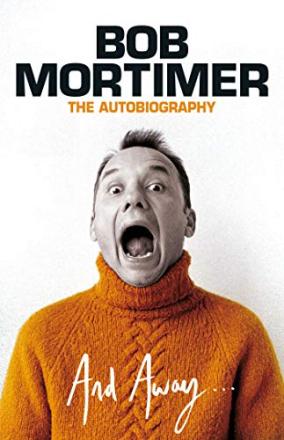
Let's get the obvious out of the way. Bob Mortimer is pretty much established as a national treasure. Maybe not in the Judi Dench league just yet, but for a generation of comedy fans – maybe a couple of generations - he is up there with the showbiz legends. So it's great to hear his story of how he got there first-hand.
I should also add for full transparency that if you prefer you can also get his story second hand – I wrote the biography of Reeves and Mortimer two decades ago, which they cooperated with, so although my book doesn't go into as much detail as Bob's book there's a bit of overlap, particularly with regard to the hysterical, historical early Big Night Out days. Completists can buy it here.
What you do get a lot more of here is the before and after personal detail. The book opens with Bob about to have heart surgery in 2015, a neat place to bounce and back forward from chapter to chapter. If there is ever a point when you are going to reflect on your life it's on the eve of surgery. Bob says the operation is pretty routine these days, but the way he describes the bone-slicing I'd definitely rather it didn't happen to me.
Mortimer, clearly a lover of the mundane, is great on the minutiae of growing up in Middlesbrough. It's a mix of relatable youthful prankage and football but touched by tragedy. Mortimer's father died in a car crash when he was very young and this cast a shadow over his life. He became extremely protective of hs mother and addicted to sugar in his tea – maybe looking for something sweet to cover up the sadness? Most of his childhood though will be familiar to anyone who grew up in the 1970s and 1980s, when bored kids had to make their own fun without the aid of wi-fi.
Most of all though, Mortimer recalls being crippled by a shyness that didn't leave him for many years. While he came alive on the football pitch and dreamed of turning professional, he rarely talked to his teammates afterwards and had few friends.
This pattern repeated itself through university where he was shocked by how posh his fellow Sussex uni students were and into his early jobs after qualifying as a lawyer and moving to Peckham. This was particularly interesting to me as even before Big Night Out fame our paths must've almost crossed – we drank in the same arty pub in Camberwell. Low moods dogged him though: "Every day I would wake up hoping that the dark cloud of depression might have magically disappeared overnight, but it never did."
The adult pivotal moment was being taken to see Vic Reeves doing a gig in a pub in New Cross. This was the moment that changed his life forever in so many ways. "I felt like I had seen the past, the present and the future of comedy." I missed those very early gigs but went to a lot of those Goldsmith's Tavern Thursday night shows and felt the same.
I have an odd memory of Mortimer at the time which the book finally clarifies. I was convinced that he was a twin as I'd seen him onstage with Vic doing occasional sketches, but on other occasions had seen someone looking exactly like Bob sitting in the audience laughing uproariously at Vic's antics. I realise now they were both Bob – he adored Vic's comedy so much that in the early days before they became a full-on double act he used to watch the bits he wasn't in from a table. Twin mystery solved.
The book takes us through the days of mega-stardom and onto other shows, from Shooting Stars to one of Bob's favourites, the much-underrated Catterick. There is personal stuff about relationships and how gradually he came out of his shell and actually managed to speak to members of the opposite sex.
The narrative chapters are punctuated by anecdotes where Bob goes into Would I Lie To You? mode. It is left to the reader to work out which of the stories about his teenage mucking about and law work are true or false. One brilliant yarn has him being out in Peckham one night when someone tries to rob him who turns out to be a client and instead respectfully leaves him alone.
And then as we come up to date we learn how Paul Whitehouse got Bob out of his post-op reclusive funk by taking him fishing. This was meant as therapy rather than a potential TV hit, but it ended up as both. That, along with his stints on Would I Lie To You? have brought Bob out as a comic star in his own right away from Vic. Bob also credits his podcast Athletico Mince with Andy Dawson as being crucial to his emergence, but until the very end there is very little reference to Train Guy, his other online hit sans Vic.
If you want showbiz anecdotes, there are glowing tributes to Jonathan Ross, Matt Berry, Reece Shearsmith, Paul Whitehouse, Mark Lamarr, Matt Lucas and others and a very funny anecdote about meeting Sinead O'Connor and being tongue-tied. This book very much homes in on the positive aspects – the only dirt here is the name of his punk band, Dog Dirt – though he does admit to failings in the acting department. His success, it seems, is based on being himself, not being someone else. In the end he has become loved for being himself. And maybe that's the best type of success of all.
Buy Bob Mortimer The Autobiography – And Away...here.



